What did the Founding Fathers have to say about the people’s “right to bear arms”? With all the current controversy regarding whether the government has the right to take away the people’s self-defense, we gathered together some quotes by the founding fathers on the subject.
George Washington
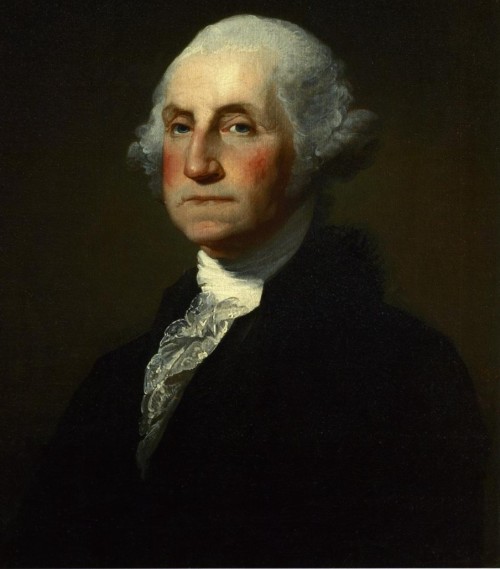
“A free people ought not only to be armed, but disciplined; to which end a uniform and well-digested plan is requisite; and their safety and interest require that they should promote such manufactories as tend to render them independent of others for essential, particularly military, supplies.” ~ First Annual Message to Congress on the State of the Union, January 8, 1790
“By teaching the people themselves to know and to value their own rights; to discern and provide against invasions of them; to distinguish between oppression and the necessary exercise of lawful authority; between burthens [archaic version of ‘burdens’] proceeding from a disregard to their convenience and those resulting from the inevitable exigencies of society; to discriminate the spirit of liberty from that of licentiousness [archaic version of ‘promiscuity’]—cherishing the first, avoiding the last—and uniting a speedy by temperate vigilance against encroachments, with an inviolable respect to the laws.” ~ First Annual Message to Congress on the State of the Union, January 8, 1790
“The [militia] is certainly an object of primary importance whether viewed in reference to the national security to the satisfaction of the community or to the preservation of order. In connection with this the establishment of competent magazines and arsenals and the fortification of such places as are peculiarly important and vulnerable naturally present themselves to consideration.” ~ Third Annual Message, October 25, 1791
Read more about George Washington here.
Read more quotes by George Washington here.
Thomas Jefferson
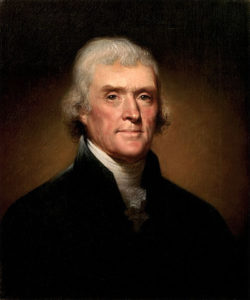
“I would rather be exposed to the inconveniences attending too much liberty than to those attending too small a degree of it.” ~ letter to Archibald Stuart, Philadelphia, December 23, 1791 (Technically, this quote is not referring directly to the second amendment, but rather refers to the writing of the constitution. We included it because it is concerns the amount of control the government should have.)
“The constitutions of most of our States assert, that all power is inherent in the people; that they may exercise it by themselves … or they may act by representatives, freely and equally chosen; that it is their right and duty to be at all times armed; that they are entitled to freedom of person, freedom of religion, freedom of property, and freedom of the press.” ~ Letter to Major John Cartwright, June 5, 1824
Read more about Thomas Jefferson here.
Benjamin Franklin
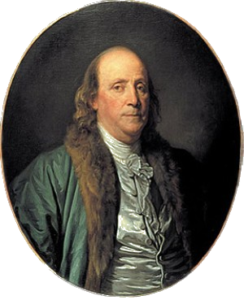
“They who can give up essential liberty to obtain a little temporary safety, deserve neither liberty nor safety.” ~ Memoirs of the life and writings of Benjamin Franklin, 1818
Read more quotes by Benjamin Franklin
Read more about Benjamin Franklin
John Adams
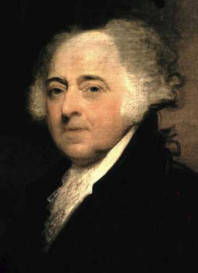
“Here every private person is authorized to arm himself, and on the strength of this authority, I do not deny the inhabitants had a right to arm themselves at that time, for their defense, not for offence.” ~ In defense of the soldiers on trial for the Boston Massacre.
“The only maxim of a free government ought to be to trust no man living with power to endanger the public liberty.” ~ notes for an oration at Braintree, Spring 1772
James Madison
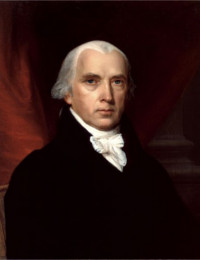
“In framing a government which is to be administered by men over men, the great difficulty lies in this: you must first enable the government to control the governed; and in the next place oblige it to control itself. A dependence on the people is, no doubt, the primary control on the government; but experience has taught mankind the necessity of auxiliary precautions.” ~ The Federalist No. 51, February 6, 1788
“Besides the advantage of being armed, which the Americans possess over the people of almost every other nation, the existence of subordinate governments … forms a foorier against the enterprises of ambition, more insurmountable than any which a simple government of any form can admit of. Notwithstanding the military establishments of the several kingdoms of Europe, the governments are afraid to trust the people with arms.” ~ The Federalist No. 46, January 29, 1788
Read more about James Madison here.
Patrick Henry
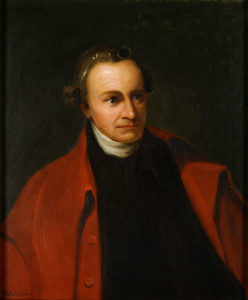
“Guard with jealous attention the public liberty. Suspect everyone who approaches that jewel. Unfortunately, nothing will preserve it but downright force.” ~ Virginia’s Constitution ratification convention, June 5, 1788
“My great objection to this government is, that it does not leave us the means of defending our rights, or of waging war against tyrants.” ~ Virginia’s Constitution ratification convention, June 5, 1788
“Where and when did freedom exist when the power of the sword and purse were given up from the people?” ~ Virginia’s Constitution ratification convention, June 5, 1788
Read more about Patrick Henry here.
Thomas Paine
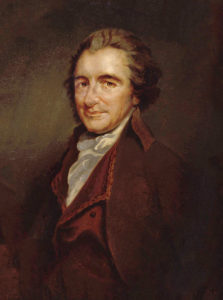
“I would gladly agree with all the world to lay aside the use of arms, and settle matters by negotiation; but unless the whole will, the matter ends, and I take up my musket and thank heaven he has put it in my power. Whoever considers the unprincipled enemy we have to cope with, will not hesitate to declare that nothing but arms or miracles can reduce them to reason and moderation. They have lost sight of the limits of humanity.” Thoughts on Defensive War, 1775
“Arms like laws discourage and keep the invader and the plunderer in awe, and preserve order in the world as well as property. The balance of power is the scale of peace. The same balance would be preserved were all the world destitute of arms, for all would be alike; but since some will not others dare not lay them aside. And while a single nation refuses to lay them down, it is proper that all should keep them up. Horrid mischief would ensue were one half the world deprived of the use of them; for while avarice and ambition have a place in the heart of man, the weak will become a prey to the strong. The history of every age and nation establishes these truths, and facts need but little arguments when they prove themselves.” Thoughts on Defensive War, 1775
Read more about Thomas Paine here.
Samuel Adams
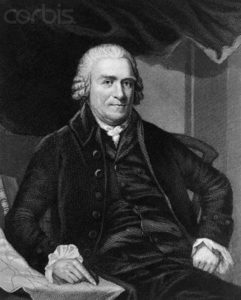
“The truth is, all might be free, if they valued freedom and defended it as they ought.” ~ published in the Boston Gazette, October 14, 1771 under the name “Candidus”
“The liberties of our Country, the freedom of our civil constitution are worth defending at all hazards: And it is our duty to defend them against all attacks. We have receiv’d them as a fair Inheritance from our worthy Ancestors: They purchas’d them for us with toil and danger and expence of treasure and blood; and transmitted them to us with care and diligence. It will bring an everlasting mark of infamy on the present generation, enlightened as it is, if we should suffer them to be wrested from us by violence without a struggle; or be cheated out of them by the artifices of false and designing men. Of the latter we are in most danger at present: Let us therefore be aware of it. Let us contemplate our forefathers and posterity; and resolve to maintain the rights bequeath’d to us from the former, for the sake of the latter—instead of sitting down satisfied with the efforts we have already made, which is the wish of our enemies, the necessity of the times, more than ever, calls for our utmost circumspection, deliberation, fortitude, and perseverance. Let us remember that ‘if we suffer tamely a lawless attack upon our liberty, we encourage it, and involve others in our doom.’ It is a very serious consideration, which should deeply impress our minds, that millions yet unborn may be the miserable sharers of the event.” ~ published in the Boston Gazette, October 14, 1771 under the name “Candidus”
“Among the natural rights of the Colonists are these: First, a right to life; Secondly, to liberty; Thirdly, to property; together with the right to support and defend them in the best manner they can. These are evident branches of, rather than deductions from, the duty of self-preservation, commonly called the first law of nature.” ~ The Rights of the Colonists, 1772
Read more about Samuel Adams here.
George Mason
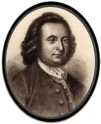
“When the resolution of enslaving America was formed in Great Britain, the British Parliament was advised by an artful man, who was governor of Pennsylvania, to disarm the people; that it was the best and most effectual way to enslave them; but that they should not do it openly, but weaken them, and let them sink gradually, by totally disusing and neglecting the militia … Why should we not provide against the danger of having our militia, our real and natural strength, destroyed? The general government ought, at the same time, to have some such power. But we need not give them power to abolish our militia.” ~ Debate in Virginia Ratifying Convention June 14, 1788
“That the People have a right to keep and bear arms; that a well regulated militia, composed of the body of the people, trained to arms, is the proper, natural, and safe defense of a free state.” ~
Within Mason’s declaration of “the essential and unalienable Rights of the People”, later adopted by the Virginia ratification convention (1788).
Samuel Nasson
Nasson is not a well-known Founding Father, so not much is written on him on this site. He was a captain in the Continental Army and after the war he rose in his local political hierarchy to the Massachusetts General Court. He was a delegate to the state ratifying convention and was one of the Maine territory’s most important Antifederalists. He strongly opposed the three-fifth’s compromise because it gave too much power to one party. He believed that the Constitution did not provide for the people’s rights and made the United States Government too much like Britain’s. He also opposed federal taxation power, standing armies, or the right to bear arms in peacetime.
“Only think how fatal [arms] were to the peace of this country in 1770, what confusion they brought on the fatal 5 of March [the Boston Massacre]. I think the remembrance of that night is enough to make us careful how we introduce them in a free republican government—I therefore hope they will be discouraged for I think the man that enters as a soldier in a time of peace only for a living is only a fit tool to enslave his fellows.” ~ Letter to George Thatcher, July 9, 1787
Noah Webster
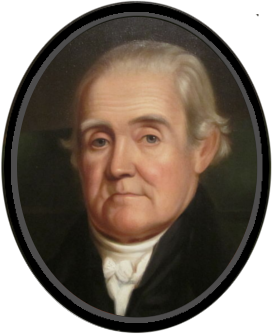
Noah Webster is sometimes listed as a Founding Father, but more frequently is called the “Father of American Scholarship and Education”. He discarded the traditional British lesson plans and educational books for children that were “corrupted by British aristocracy” and wrote his own—updating and “americanizing” the spelling—which were used for generations. It is his name that we use on the Merriam-Webster Dictionary.
He was an avid Federalist and as such, severely disliked Jeffersonian Republicans. He helped found an anti-slavery society, but wrote to his daughter: “Slavery is a great sin and a general calamity—but it is not our sin, though it may prove to be a terrible calamity to us in the North. But we cannot legally interfere with the South on this subject … To come north to preach and thus disturb our peace, when we can legally do nothing to effect this object, is, in my view, highly criminal and the preachers of abolitionism deserve the penitentiary.”
“Another source of power in government is a military force. But this, to be efficient, must be superior to any force that exists among the people, or which they can command; for otherwise, this force would be annihilated, on the first exercise of acts of oppression. Before a standing army can rule, the people must be disarmed; as they are in almost every kingdom in Europe. The supreme power in America cannot enforce unjust laws by the sword; because the whole body of the people are armed, and constitute a force superior to any band of regular troops that can be, on any pretense raised in the United States.” ~ “An Examination Into the Leading Principles of the Federal Constitution Proposed by the Late Convention Held at Philadelphia, With Answers to the Principal Objections that Have Been Raised Against the System” January 1, 1787


